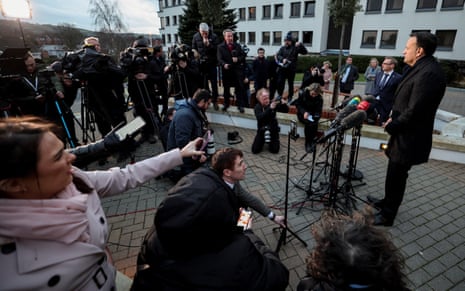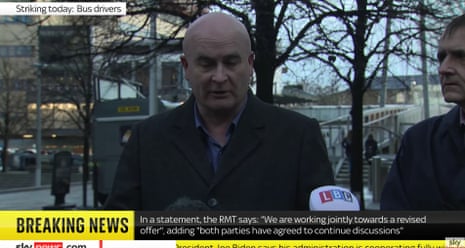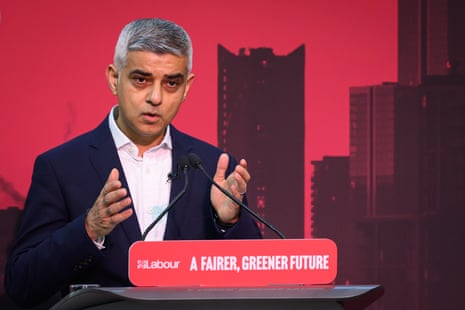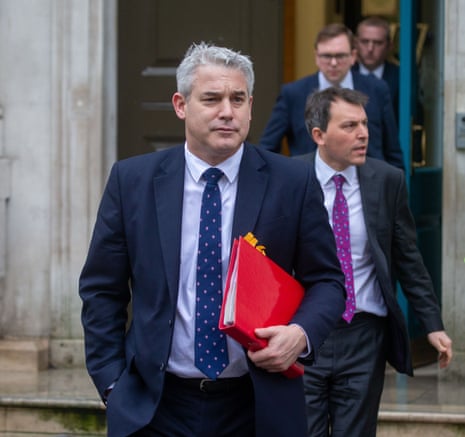Ballot by NASUWT teaching union fails to meet threshold for strike to go ahead – despite ‘overwhelming’ vote in favour
The NASUWT teaching union has said its members in England and Wales voted overwhelmingly for strike action – but that the strike will not go ahead because turnout in the ballot was less than 50%.
Ballot Result: 9 in 10 of our members voted to strike for the pay they deserve.
But despite this overwhelming result, the Government’s anti-trade union legislation has prevented members in state-funded schools and colleges from taking industrial action.
Our statement: pic.twitter.com/D0urnDN2NG
— NASUWT (@NASUWT) January 12, 2023
Our ballot turnout was 42% higher than the turnout to elect the Prime Minister & 7% higher than the average local govt election turnout.
But the Govt’s anti-trade union laws will block teachers from taking action to win fair pay.
We will fight on for a #BetterDealForTeachers. pic.twitter.com/YtVlQBBY2A
— NASUWT (@NASUWT) January 12, 2023
Under employment laws, unions can only go ahead with a strike if more than 50% of workers take part in the strike ballot and there’s a majority in favour.
But in what are deemed important public services (fire, health, education, transport, border security and nuclear decommissioning – the six categories also covered by the government’s new anti-strike bill), a second threshold applies, and strike votes are only valid if 40% of those entitled to vote actually vote in favour.
The NASUWT said the vote demonstrated “the anger of the profession” and the need for the government to address their concerns.
The NEU teaching union is also balloting its members on strike action, and the results of the vote are due to be announced on Monday.
Key events
Afternoon summary
-
Teachers in the NASUWT will not strike in England and Wales after the union failed to hit the mandatory 50% turnout threshold for its ballot – even though those people who did participate voted “overwhelmingly” in favour of action. The NEU teaching union is still balloting members about a strike, the results of which will be announced on Monday. See 3.25pm.
-
Leo Varadkar, the taoiseach (Irish PM), has criticised James Cleverly’s refusal to allow the Sinn Féin president, Mary Lou McDonald, to attend a meeting he was due to hold with Sinn Féin leaders in Northern Ireland yesterday. Because McDonald, who is based in Dublin and sits in the Irish parliament, was not allowed to attend, Michelle O’Neill, the Sinn Féin leader in Northern Ireland and the first minister designate, did not attend. Speaking about the row on a visit to Belfast, Varadkar said:
It is not something that was the case in the past. I know that deputy McDonald has attended similar meetings in the past organised by the British government and if it is a change, I don’t think it is a positive one.
Generally, the approach we take in the Irish government is that if we ask to meet somebody, we don’t proscribe who is on their delegation.
I think that is perhaps a better protocol. I don’t want to engage in criticism of the secretary of state. But the view I take is that the best protocol is to allow people to decide who is on their own delegation.

Sunak’s stop-start policies harming UK green investment, says net zero tsar
Rishi Sunak has been criticised by his own net zero tsar, who says the UK risks missing its green targets due to inconsistent policies and lack of commitment to pledges, my colleagues Helena Horton and Fiona Harvey report.
Mick Lynch, the RMT general secretary, would not really elaborate beyond the short statement issued by his union on Twitter (see 4.19pm) when he spoke to reporters as he left the talks with the Rail Delivery Group. He said the discussions had been detailed, and that the union and the Rail Delivery Group would be working on a revised offer over the next couple of days.

RMT says it is ‘working towards revised offer’ with Rail Delivery Group after today’s strike talks
The RMT rail union says it is “working jointly towards a revised offer” with the Rail Delivery Group following its talks today about resolving the train strikes.
???? BREAKING@RMTunion statement on today’s negotiations with the @RailDeliveryGrp
“We have had detailed discussions and we are working jointly towards a revised offer.
“Both parties have agreed to continue discussions over the next few days.”— RMT (@RMTunion) January 12, 2023
The Cabinet Office has released a readout of the meeting its minister Jeremy Quin had with civil service unions earlier today. This is the one the PCS union described as a “total farce”. (See 3.09pm.)
A Cabinet Office spokesperson said Quin scheduled the meeting “to listen to and understand” union concerns, as part of “the government’s commitment to engaging with unions across the board”. The spokesperson went on:
The meeting included discussions to help ensure fair and affordable public sector pay settlements. We regret the PCS decision to call further strike action, but discussions will continue and we have comprehensive plans in place to keep essential services running and to minimise disruption.
Andrew Bridgen claims his anti-vaccine Holocaust comparison was ‘in no way antisemitic’
Andrew Bridgen, who had the Tory whip removed yesterday after he posted a message on Twitter saying that a consultant cardiologist had told him the use of Covid vaccines was “the biggest crime against humanity since the holocaust”, has issued a statement insisting that this comment was “in no way antisemitic”. He says:
My tweet of 11th of January was in no way antisemitic.
Indeed, it alluded to the Holocaust being the most heinous crime against humanity in living memory.
Of course, if anyone is genuinely offended by my use of such imagery, then I apologise for any offence caused.
I wholeheartedly refute any suggestion that I am racist and currently I am speaking to a legal team who will commence action against those who have led the call suggesting that I am.
But in his statement Bridgen defends his right to raise concerns about mRNA vaccines – even though these unfounded conspiracy theories are widely seen as dangerous to public health. In a sign that he does not expect to be allowed to stand as a Tory candidate again, he says:
If I cannot [continue to ask questions about the safety of mRNA vaccines] as a Conservative member of parliament, then so be it.
Please watch my YouTube video about my suspension as a member of the parliamentary Conservative Party and why I will keep on highlighting important questions surrounding MRNA vaccines. https://t.co/RxTGRKyZl2
— Andrew Bridgen (@ABridgen) January 12, 2023
Sadiq Khan calls for regional occupational shortages list to help cities counter problems created by Brexit
Sadiq Khan, the Labour mayor of London, has released more extracts from the speech he will deliver tonight at the Mansion House in the City. As reported earlier (see 9.17am), he will criticise politicians for not being willing to talk about the damage done by Brexit and call for a “pragmatic debate” about the case for rejoining the single market and the customs union.
According to the new extracts, Khan will call for creation of regional occupational shortages lists (lists of jobs where foreign workers can get visas easily, because there are not enough Britons to fill them). This would allow the London mayor to draw up a shortage list for London, he will say.
The number of businesses in our city experiencing at least one skills shortage has now risen to almost seven in 10. Meanwhile, the number of jobs in our city held by EU-born workers has fallen by over 80,000 – putting huge strain on crucial sectors such as hospitality and construction.
Devolving powers to London and allowing us to create a regional shortage occupation list would be one way to give businesses the ability to attract and retain talent in the areas they need it most.
Khan will also say that, as mayor of London, it would be a “dereliction of duty” for him not to speak out about Brexit. He will say:
No one wants to see a return to the division and deadlock that dominated our body politic for five long years. However, the inescapable truth is that this unnecessarily hardline version of Brexit is having a detrimental effect on our capital and country – at a time when we can least afford it.
We can’t – in all good conscience – pretend that it isn’t hurting our people and harming our businesses. As mayor of this great city, choosing not to say anything would be a dereliction of duty …
We’re gathered in one of the great financial districts in the world – supporting millions of jobs and generating billions in tax revenue – but the reality is that the City of London is being hit hard by the loss of trade and talent to our competitors because of Brexit. London cannot afford to fall behind any of our international competitors.

Ballot by NASUWT teaching union fails to meet threshold for strike to go ahead – despite ‘overwhelming’ vote in favour
The NASUWT teaching union has said its members in England and Wales voted overwhelmingly for strike action – but that the strike will not go ahead because turnout in the ballot was less than 50%.
Ballot Result: 9 in 10 of our members voted to strike for the pay they deserve.
But despite this overwhelming result, the Government’s anti-trade union legislation has prevented members in state-funded schools and colleges from taking industrial action.
Our statement: pic.twitter.com/D0urnDN2NG
— NASUWT (@NASUWT) January 12, 2023
Our ballot turnout was 42% higher than the turnout to elect the Prime Minister & 7% higher than the average local govt election turnout.
But the Govt’s anti-trade union laws will block teachers from taking action to win fair pay.
We will fight on for a #BetterDealForTeachers. pic.twitter.com/YtVlQBBY2A
— NASUWT (@NASUWT) January 12, 2023
Under employment laws, unions can only go ahead with a strike if more than 50% of workers take part in the strike ballot and there’s a majority in favour.
But in what are deemed important public services (fire, health, education, transport, border security and nuclear decommissioning – the six categories also covered by the government’s new anti-strike bill), a second threshold applies, and strike votes are only valid if 40% of those entitled to vote actually vote in favour.
The NASUWT said the vote demonstrated “the anger of the profession” and the need for the government to address their concerns.
The NEU teaching union is also balloting its members on strike action, and the results of the vote are due to be announced on Monday.
Civil servants’ strike set to go ahead on 1 February after PCS brands meeting with minister ‘total farce’
The PCS union has described a meeting it had today with the Cabinet Office minister Jeremy Quin a “total farce”.
The PCS represents civil servants and yesterday it announced that it it expected more than 100,000 people, working across 124 government departments, to go on strike over pay on Wednesday 1 February.
After the meeting with Quin, Mark Serwotka, the PCS general secretary, said in a statement:
This meeting was a total farce. Despite being well-trailed by the government as a chance to resolve the crisis, it was nothing of the sort because the minister had nothing to offer.
He didn’t deny our members were being offered less than anyone else, he didn’t deny tens of thousands of our members only get a pay rise because of the rise in the national minimum wage but he refused to give us a pay rise now.
Despite all we told him, despite knowing the alternative would be sustained industrial action, he still refused to budge, saying he could only talk about 2023-24.
Serwotka also said the 1 February strike could be followed by others.
Prospect, another union representing civil servants, was also at the meeting and afterwards its general secretary, Mike Clancy, said it would continue with its plans to ballot its members on strike action because Quin had nothing to offer. Clancy said:
At the meeting I asked the minister if the government planned to continue with real-terms pay cuts for civil servants as it has done for the last decade or more. In his answers the minister refused to offer any more money for 2022-23 and gave no grounds for optimism that the position would be any different in the coming pay year.
It is clear that civil servants remain at the back of the queue for public sector pay. We see no alternative at this point than to continue to pursue our formal ballot for industrial action.
Echoing Mick Lynch (see 1.48pm), Luke Chester, organising director at the TSSA rail union, also said he expected to hear a fresh offer when he arrived for talks with the Rail Delivery Group. He said:
We are expecting a fresh set of negotiations hopefully, a fresh offer, something better than was previously on the table. That’s not going to be very difficult because what was previously put on the table was totally unacceptable.

Scope, the disability charity, has welcomed the news that the government is considering allowing disabled people to continue to get benefits as they return to work. (See 9.49am.) James Taylor, the charity’s director of strategy, said:
It’s good to see the government acknowledge that the benefits system isn’t working for disabled people.
The work capability assessment isn’t fit for purpose, and high levels of successful appeals against poor decision-making continue year after year.
Here is my colleague Aubrey Allegretti’s story on what the government is considering.
And these are from Chris Smyth at the Times on the difference between the Labour and Tory proposals in this area.
Both main parties now looking at major benefit reform to change incentives in disability and sickness benefits.
But seems to be difference in favoured mechanism.
Labour wants people getting a job to be able to return automatically to same benefits…. 1/2 https://t.co/dt8RRCgAVU
— Chris Smyth (@Smyth_Chris) January 12, 2023
But Tories think this will incentivise people to quit as time limit for avoiding fresh assessment approaches
They are looking at a system where people keep benefits while moving into work but payments are gradually tapered off as with Universal Credit as earnings increase
— Chris Smyth (@Smyth_Chris) January 12, 2023
The Stroke Association says people are dying because of ambulance waiting times. Commenting on today’s figures showing that ambulances in England are taking an hour and a half on average to respond to category 2 calls (which cover strokes – see 10.25am), Juliet Bouverie, chief executive of the Stroke Association, said:
It’s hard not to despair at the state of the health service. Over an hour and a half is an unacceptably long wait for an ambulance when you’re having a stroke. Every minute waited is a shortened chance of survival or weeks more rehabilitative therapies. These delays are causing severe disability and even death.
I am incredibly worried that this is a chronic crisis situation for the ambulance service. This has life-threatening consequences for thousands of stroke patients.
Labour says NHS facing ‘biggest crisis in its history’
Wes Streeting, the shadow health secretary, says the current NHS crisis is the worst ever. Commenting on today’s ambulance and A&E waiting time figures, he said:
The NHS is in the biggest crisis in its history. The terrifying truth is that patients in an emergency can no longer be sure the NHS will be there for them.
Heart attack and stroke victims are routinely waiting over three hours for an ambulance, when every second counts. 24 hours in A&E is not just a TV programme, it is the grim reality for too many patients. Too many lives are being lost as a result.
After 13 years of Conservative mismanagement of the NHS, expecting them to fix this crisis is like asking the arsonist to put out the fire they started – it is not going to happen.

Longer waits in A&E departments will mean more patient deaths, Prof Ian Higginson, the vice-president of the Royal College of Emergency Medicine, told Radio 4’s the World at One. He said:
For every 82 patients who wait more than six hours in an emergency department, there is one associated death. So, if more patients are waiting longer in emergency departments there will be more associated deaths.
Higginson also said that tackling the issue would require sustained long-term investment. He said:
There are no easy, quick fixes to what we are seeing now. We need to acknowledge there is a problem, we need to acknowledge the scale of it.
This is going to take long-term investment, long-term solutions. We can’t short-term our way out of this particular problem.
Mick Lynch arrives for talks with Rail Delivery Group saying he expects new offer, but not generous one
Mick Lynch, the RMT general secretary, said that he was expecting to hear a revised pay proposal when he arrived for talks with the Rail Delivery Group. He told reporters:
We’ve been advised that there is a new proposal available – whether it’s mature enough for it to just be: ‘Here it is’, or we have to talk through a few bits and pieces, we will see when we read it.
Lynch said he did not expect the new offer to be generous. He explained:
It will be a very tight proposal. It will not be generous. It will be way below inflation and it will have very onerous conditions on it.
We will definitely not get a clean pay proposal which just says: ‘Here’s the pay’. They’re not in a position to do that and they’ve been instructed directly by the government that they’re not allowed to do that.
So, it will be a big document that we’ve got to consider and we’ll have to put it to our people, let them see it and then ask them what they think of it – if we get it, there’s a big if there.
Lynch also said that when the offer was “in a position to vote on”, there would be a ballot of members about whether to accept it.

The Department of Health and Social Care has issued a readout of Steve Barclay’s meeting this morning with the British Medical Association and two smaller health unions, the British Dental Association and Hospital Consultants and Specialists Association. (See 11.42pm and 11.48am.) It is relatively non-committal, and it does not contradict anything the unions said about the meeting.
For the record, here is an extract.
[Barclay] noted that inflation is forecast by the OBR to fall to 5.5% in 23/24, but that outcome is conditional on fiscal discipline. However he said he appreciates competing workforce and cost of living pressures, which he is keen to discuss in the context of the evidence for the pay review body.
[Barclay] welcomed the constructive discussion and shared interest in making the health service better, with opportunities identified to look at reform measures to improve outcomes for patients and help staff. For example, improving IT and freeing up clinicians’ time to focus on patients, not admin.
He finished by saying that he hoped to continue talking, and he will take away the points raised as part of discussions happening across government.

GMB union considering up to six more strikes in ambulance service
The GMB union is considering holding up to six more ambulance strikes. Its union representatives in the ambulance service are meeting on Monday to discuss future action. A union source told HuffPost UK:
The GMB is meeting ambulance reps on Monday and is likely to announce a load more strike dates, possibly up to six.
Stay connected with us on social media platform for instant update click here to join our Twitter, & Facebook
We are now on Telegram. Click here to join our channel (@TechiUpdate) and stay updated with the latest Technology headlines.
For all the latest Education News Click Here
